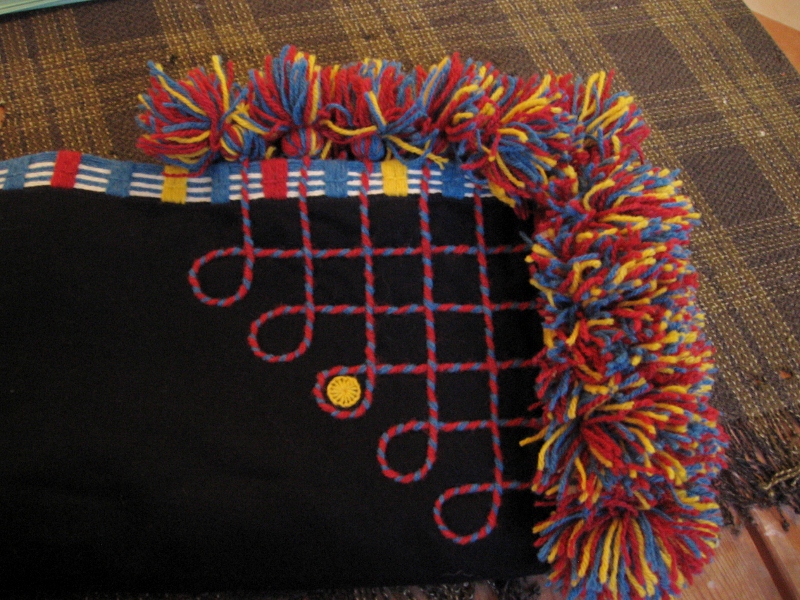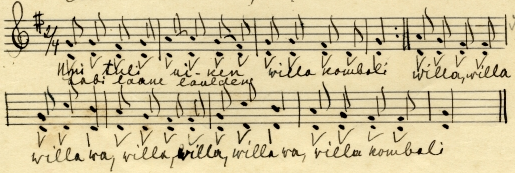Sun, Moon and Stars

I got up in the morning,
before the light of day.
What was my first task?
Big washing of my face,
large grooming of my hair,
quickly putting on my shoes.
I trod my way to the pond,
made footsteps to the lake,
brought to drink to the Jutiks,
carried water to Kareses1.
What did I find on leaving,
what on returning home?
I saw a horse dying,
a linen mane falling.
I ran over to watch –
I tore a horsehair, tore the other,
took them home to my mother.
"My darling mother, tender mother,
my dear bearer, my little bird,
please, weave me big hankies,
make large tablecloths.
Weave the Moon signs to the end,
the Sun signs on the top,
pour copper yarn at the edge,
a Rainbow print in the middle of them.
Then the Moon will woo me,
the Dawn will bring betrothal wine."
"Hello, beautiful sky-daughter,
under heaven, you wise child –
will you be a Sun's wife,
the bride of the Sun's son?" –
"The Sun has a lot of trouble –
getting up in the morning
going down in the evening."
"Hello, beautiful sky-daughter,
under heaven, you wise child,
will you be a Moon's wife,
a bride of the Moon's son?" –
"No, I won't be a Moon's wife,
a bride of the Moon's son.
The Moon has a lot of trouble –
sometimes waning, sometimes waxing,
and the third time it goes without."
"Hello, beautiful sky-daughter,
under heaven, you wise child,
will you be a Star's wife,
a bride of the Star's son?" –
"I need to wed the Star,
to become a wife of the Star's son.
The Star has good horses,
the Star has nice oat eaters.
Their manes flutter on the clouds,
their heads dance to the heavens,
their lips make a reel,
their hooves weave fabric."
1 Jutik, Kares – the names of the cows
![]()
Tõusin üles hommikul,
enne varavalget.
Mis oli töö mul esimene?
Suur näo-pesemine,
lai pea-sugemine,
käbe jala-kängimine.
Tegin tee tiigi poole,
jätsin jäljed järve poole.
Tõin juua Jutikule,
kandsin vett Karesele.
Mis ma leidsin sinna minnes,
mis [leidsin] koju tulles?
Nägin hobu surevat,
linalaka langevat.
Jooksin juurde vaatama –
katkusin jõhvi, katkusin teise,
viisin koju ema kätte.
"Emakene, hellakene,
oh mu kandja, linnukene,
koo sa suured suurätid,
loo laiad laudlinad.
Otsa koo kuutähed,
peale koo päevatähed,
veerde vala vasklõnga,
keskele loo loogakirja.
Siis tuleb Kuu mulle kosja,
Agu kihlaviina andma."
"Tere, ilus ilmatütar,
taeva all sa tark laps,
kas sust saab Päikse naine,
Päikse poja pruudikene?" –
"Päiksel on ju palju vaeva –
hommikul tõusmine,
õhtul looja minemine."
"Tere, ilus ilmatütar,
taeva all sa tark laps,
kas sust saab Kuu naine,
Kuu poja pruudikene?“ –
"Ei must saa küll Kuu naist,
Kuu poja pruudikest.
Kuul on ju palju vaeva –
korra kaob, teise kasvab,
kolmanda puudub koguni.“
"Tere, ilus ilmatütar,
taeva all sa tark laps,
kas sust saab Tähe naine,
Tähe poja pruudikene?“ –
"Tähele mul vaja minna,
Tähe poja naiseks saada.
Tähel on head hobused,
Tähel kaunid kaerasööjad.
Lakk neil pilvedele lehvib,
pea neil tantsib taevastesse,
huuled teevad kangapoole,
kabjad koovad kangast.“

Põlva khk. Sõba. A plaid.
The shepherd evening song.
Roll along, roll dear Sun [=day],
elle elle leelo leelo,
roll to your brother,
wheel to your sister!
Your brother is five versts away,
sister is behind six spruces.
There you will be cherished,
you will be held on the palm,
carried in the hollow of the hand,
put to sleep on pillows,
to rest in silk,
to fall into a golden bed,
to float into a silver bed.
Karjalaste laul. Õhtul.
Veere, veere, päevakene,
elle elle leelo leelo,
veere sinna, kus su veli,
keerle sinna, kus su õde!
Veli viie versta taga,
õde kuue kuuse taga.
Seal sind hellalt hoitakse,
peo peal sind peetakse,
kamalus sind kantakse,
pannakse padjule magama,
siidi sisse puhkama,
kuldsängi kukkuma,
hõbesängi hõljuma.
On long winter evenings, when the spinning wheels are merrily whirring in front of virgins and in hands of grandmothers, when the silver-clear Moon shines in the sky, old people have much to tell about the Moon Maiden. The younger ones even eat these words with their ears, when the grandmother talks about how the have come onto the Moon.
Long ago there lived an orphan. She lived in the house of very unkind people. At dawn, she was the first to leave for work and at dusk, she was the last to lie down to sleep. Even on Saturday afternoons she could not go to the sauna* with the others, but was only allowed to go there much, much later. Once, after she’d taken her sauna, she crossed the yard, carrying her birch whisk and pail, and she begged of the Moon,
Moon my dear, Moon my love,
Take me away, take me to thee!
Scant is my food in summer,
Freezing are my feet in winter!
Whereupon the Moon gathered the orphan up and she was lifted all the way to the Moon. Ever since then, we’ve been able to see a little girl, with a birch whisk and a pail, in the Moon. If another child on earth as good as she can be found, the Moon will gather that child up as well. However, since then no child that good has ever been found.
Pikkadel talveõhtutel, kui vokid neitsite ees ja vanaemakeste käes virgalt vurisevad, siis kui hõbeselge kuu taeva küljes paistab, on vanadel inimestel kuuneitsist üht-teist kõnelda. Nooremad söövad lausa kõrvadega sõnu, kui vanaema pajatab, kuidas inimesed kuu peale saanud.
Ükskord vanasti elanud üks vaenelaps kurja pererahva juures. Peremees ja perenaine pole talle ilmaski asu andnud. Alati pidi vaenelaps enne teisi tööle minema ning õhtul hilja pärast teisi pimedani väljas olema. Ka laupäeva õhtul ei tohtinud ta teistega koos sauna minna ikka alles pärast teisi. Kord tulnud ta saunast välja, võtnud viha ja pange kätte ning hakanud kuud paluma:
Kuukene, kullakene,
võta mind enesele!
Suvel söön ma soolata,
talvel käin ma kingata!
Siis võttis kuu vaeselapse üles enda manu. Tollest ajast saadik näemegi kuu peal väikest tüdrukut, ühes käes pang, teises viht. Kui maa peal veel kunagi mõni niisama hea laps leitakse kui too vaenelaps, siis võtab kuu ka tema enda juurde. Tänase päevani pole aga ühtegi sellist last veel leitud.

Slumber comes a-calling,
villa kombalii,
through the forest a-singing,
villa kombalii.
Refr: Villa kompalija,
villai, villai, villaija,
villai, villai, villaija,
villa kompalija.
The sleigh, made of pine,
spoke sticks of juniper.
The path took man went in the forest,
bridleless horse in the swamp,
The reins touched the apple tree,
the rods ran in the cherry tree,
I called the Moon, I asked the Sun,
the Moon didn't hear the calling,
the Sun a lot of asking.
The Moon listened under the dead grass,
the Sun thought behind the forest.
Uni tulõ uigatõn,
villa kombalii,
läbi laanõ lauldõ'õn,
villa kombalii.
Refr: Villa kompalija,
villai, villai, villaija,
villai, villai, villaija,
villa kompalija.
Regi perän pedäjäne,
kausspuu kadajanõ.
Mõtsa läts´ mehe tii,
suhu suitsõta obõnõ,
puttuq uhjaq uibu’ehe,
sebivitsaq visnapuudõ.
Kutsõ kuuda, palssi päivä,
kuu es kuulõq kutsumist,
Päiv es palju pallõmist,
kuu kullõl´ kulu all,
päiv mõtõl´ mõtsa takan.

